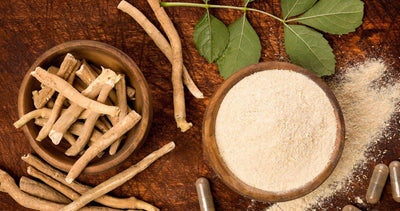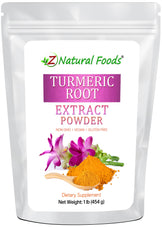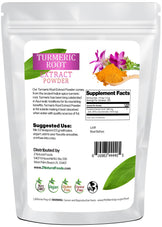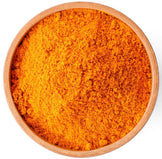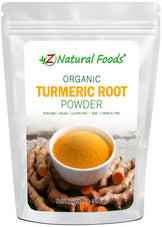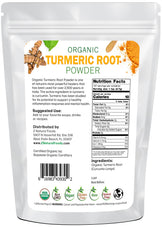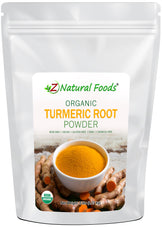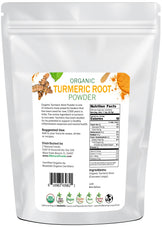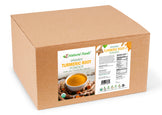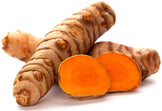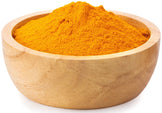Description
Description
If you have ever wondered what is healthier, turmeric or cayenne pepper, you have come to the right place.
To answer whether turmeric or cayenne pepper is better for your health, it is essential to first define what the term “better” means and its relationship to specific foods that may affect your overall health.
In this case, better is defined as something of higher versatility and nourishing qualities.
Turmeric or Cayenne Pepper: Which is better for your health?
Turmeric's cooling nature has been shown to have powerful effects on the inflammation cascade. Hot in temperature, spicy, and pungent in flavor, Cayenne can be beneficial for those with imbalances driven by coldness, congestion, and poor circulation. While cayenne and turmeric both have many unique qualities individually, they also have similar benefits and may support one another in many of your intended goals.
To properly answer this question, we must look at the nourishing and medicinal qualities these spices provide and their specific effects when accurately defining the term “better” in this particular context.
Let's get started.
What's better for your health, turmeric or cayenne?
Every culture defines how and why an individual food is considered “healthy” based on various factors.
For example, let’s briefly compare Western medicine to Traditional Chinese Medicine and their respective definitions of healthy:
- According to Western medicine, healthy food is a substance that provides the nourishment needed to sustain well-being and retain energy.
- Traditional Chinese Medicine looks at food from a slightly different perspective. According to TCM, food is not defined as healthy or unhealthy but, instead, if it is the right food for an individual at a specific time. According to Traditional Chinese Medicine (TCM), all foods have energy.
TCM teaches us that foods have Yin/ Yang energy, five temperatures, five flavors, and four directions. In these principles, Yin and Yang's action is the general property, and temperature is the extremeness of the properties.
In simple terms, Yin is cooling, builds blood, and has downward moving energy. Yang is warming, energizing, and has upward-moving energy.
Next, to understand health in this specific context, it is vital to discuss how to evaluate the effects of the food or substance we are ingesting.
We believe a healthy way to assess the effectiveness of natural substances like food, herbs, and spices on any individual is to look at how each of us may respond uniquely.
It is challenging to provide specific guidelines because we all have intrinsically unique differences in how we react physically and emotionally to what we consume. A great example is how Traditional Chinese Medicine (TCM) evaluates an individual based on their current physical and mental well-being.
According to TCM principles, many things may change significantly between acupuncture treatments and herb consultations. Therefore, the practitioner will change the treatment protocol to balance any excesses or deficiencies based on the patient's health at that time. Traditional Chinese Medicine (TCM) methods may provide a healthier and more accurate perspective.
Wholesome vs. Partsome
As you search online or in the isles of a health store, you may notice a wide array of turmeric and cayenne products.
If the herb is presented in extract form, some of the facts you will want to take note of are whether or not the herb has been standardized and to which specific constituents.
If it is a full-spectrum extract, take note of its concentration level.
For example, turmeric may be standardized to a particular percentage of curcuminoids and cayenne to capsaicin.
In both instances, they are just one of the many active constituents in each spice.
The umbrella term “extract“ describes various highly concentrated variations that create unique variables for how these powerful spices are potentially used for their nourishing qualities.
Some of these variables are defined in concentration levels.
- Full spectrum extracts concentrate a food or herb as a whole (1:1, 4:1, 10:1, 25:1and 100:1, just to name a few), so you are getting all constituents found in that food in a highly concentrated, well-balanced manner. Ultimately, they present a well-balanced whole food complex.
- Isolated standardized extracts separate and focus on a particular family of compounds. It is essential to understand that isolated standardization does not produce a well-balanced end product but may provide a more targeted approach for the specific purpose of using that food or herb.
One of the many reasons people make standardized products is because the compounds considered the powerhouse are believed not to be utilized by the body as efficiently when presented in a full spectrum complex.
This information is not accurate.
Many studies prove that the overall effects are better and more balanced when all constituents are present.
A great example is that curcumin (a turmeric compound) is touted as one of the most remarkable compounds for supporting a healthy inflammation response due to its unique mechanisms of action (Modulating Nuclear factor kappa B).
Turmeric has been shown to potentially support more robust and broad-spectrum benefits. To support this idea, research has shown that curcumin-free turmeric extracts are as capable of supporting a healthy inflammation response.
The following statement was made in a review discussing the identification and effectiveness of specific compounds found in turmeric,
“Recent research has identified numerous chemical entities from turmeric other than curcumin. It is unclear whether all of the activities ascribed to turmeric are due to curcumin or whether other compounds in turmeric can manifest these activities uniquely, additively, or synergistically with curcumin. However, studies have indicated that turmeric oil, present in turmeric, can enhance the bioavailability of curcumin.”
Furthermore, specific essential oils in turmeric are necessary to properly utilize curcumin. Curcumin's ability to support a healthy inflammation response as one of its key benefits has produced a fallacy that turmeric is an anti-inflammatory. In fact, the results of human research, the experience of many top herbalists, and the fact that turmeric has many modes of action (upwards of 300 activities have been ascribed to it) show its ability to possibly be an amphoteric (normalizing the function of an organ or system).
Another example is the following study discussing the effects of turkey tail mushrooms when specific constituents are absent. While this study is unrelated to turmeric, it is another excellent example of why all components should be present to obtain optimal results.
A study discussing the polysaccharide K from turkey tail mushrooms showed that when lipase was applied, it reduced the immunological response of PSK by 80%. This shows the importance of the associated lipids bound to the beta-glucans and that just their independent presence of them is not enough to obtain maximal benefits.
Turmeric: A Traditional Chinese Medicine (TCM) Perspective
Turmeric, known as Jiang Huang in TCM, translates into fragrant gold, has a pungent, bitter flavor, is slightly cool in nature, and acts upon the heart, liver, lung, and gallbladder channels.
TCM believes that turmeric can invigorate the blood and support healthy circulation, preventing what TCM calls stagnation.
Stagnation occurs when Qi and blood fail to move correctly and is one of the most common imbalances in the human body. It is crucial to understand that nothing in TCM is cut and dry.
This imbalance is known to cause a broad spectrum of potential symptoms because when stagnation occurs, it creates an environment to allow things to build up in the stagnated area. This phenomenon can also cause deficiencies due to the lack of Qi and blood flow in other areas.
Because turmeric has a cooling and dispersing nature, it is considered an excellent tool for heat stagnation issues like fever, depression, and pain. One of the many reasons for heat stagnation is sympathetic overdrive which creates too much cortisol and adrenalin.
While turmeric's cooling nature has shown to have powerful effects on the inflammation cascade, it also seems to be helpful for those whose issue is caused by a cooling-induced heat.
This pathology describes inflammation symptoms that worsen in cold weather, like Osteo and Rheumatoid arthritis, versus those that worsen in warm weather.
This is why it is essential to distinguish between cool-induced and heat-induced heat and if the individual has a cold or warm constitution. Because our blood is fluid, it follows the same principles as the viscosity of water.
- At cooler temperatures, it is more viscous and flows slower and less freely.
- At warm temperatures, it is less viscous and flows faster and more freely.
So, if your body fails to maintain a warm enough body temperature, TCM principles state that your blood begins to thicken and flows less smoothly. As stated earlier, TCM looks at the individual and their response to many factors, so there is no one simple answer for everyone.
Although TCM principles dictate that turmeric is a cooling herb, it is also considered a warm and spicy herb that warms and invigorates the blood. However, the bitterness of turmeric is believed to drive the effect deeper and has a dredging effect. The Chinese materia medica states that turmeric can disperse clumping in the circulation, powerfully restoring flow and thereby reducing inflammation.
For two excellent articles about turmeric, you are invited to review these two resources:
Cayenne: An Eastern vs. Western Perspective
The late great Master Herbalists and Naturopathic doctor, Dr. John R Christopher, believed that cayenne was one of the most extraordinary medicines on mother earth.
He believed the power of Cayenne was crucial for supporting one of the major underlying causes of all that ailed us; poor blood flow, circulation, and digestion.
He also believed that working up to one teaspoon of cayenne three times daily in a glass of water was one of the most beneficial things someone can do for their well-being.
A lack of healthy blood flow and circulation often weakens arteries, veins, and blood vessels, the glue that holds organs and the systems connecting them.
The body can not function optimally if blood flow and circulation are weak. According to Western herbal theory, this is where Cayenne takes the lead.
Dr. Christopher also believed cayenne is a perfect accentuator for all herbal formulas. In simple terms, adding cayenne to an herbal formula will make that formula work better based on cayenne’s primary purpose.
According to a study published in the Journal of the American College of Cardiology, regular chili pepper consumption more than four times a week was associated with a 23% lower risk of all-cause mortality for cardiac events.
Hot in temperature, spicy, and pungent in flavor, Cayenne is also known as La Jiao. Cayenne enters through the heart, spleen, and stomach meridians, promoting Yang Qi, circulation of Qi and blood, dissipating cold stagnation, clearing obstructions, and tonifying the stomach and spleen.
In simple terms, TCM believes Cayenne Tonifies Yang (heat element), resolves dampness, and expels wind, although due to its intense nature, to prevent causing an imbalance, it should be used with some caution.
While Cayenne is a potent medicinal that represents Yang (heating element), there is a significant flaw in Dr. Christopher's and other “Cayenne Doctors” medicinal approaches to using this powerful spice.
While their aggressive “putting out a fire with fire” strategy may sometimes work, it is not necessarily suitable for all.
There is simply a lack of balance regarding nourishing the Yin(cooling element). According to TCM, cayenne is contraindicated for those who present a Yin deficiency with fire symptoms. This is a pattern strongly associated with inflammatory conditions such as wasting syndromes. Although, it should be noted that Cayenne can be beneficial for those who present with imbalances driven by coldness, congestion, and poor circulation.
It is also appropriate for those who show no signs of Yin-deficient parasympathetic exhaustion, presenting with increased sweating or a low-grade fever.
So, is Turmeric or Cayenne better for your health?
Both of these magnificent foods present powerfully nourishing benefits to those who use them under the right circumstances.
Because we believe the individual and their specific circumstances at present dictate the path they should take, we look to presenting facts so you can make a well-informed, educated decision.
While cayenne and turmeric have many unique qualities individually, they also have similar benefits and may support one another in many of your intended goals.
Therefore, the only clear-cut answer is that having a wide variety of herbs and spices in your diet will provide you with a profound level of nourishment to support fundamental aspects of your well-being.
For more information about our Organic Turmeric Root Powder, go here:
For more information about our Organic Cayenne Pepper Powder, go here:
To review all of our herb and root powders, go here
